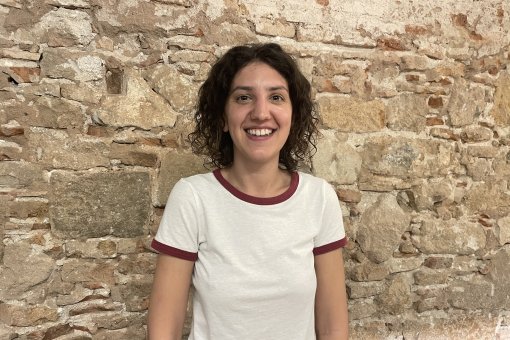Images
Participants

Contact

Iranian researcher Bahareh Eftekharzadeh did her PhD at IRB Barcelona (Laboratory of Molecular Biophysics, Xavier Salvatella), and she did her postdoc work at the University of Harvard and Massachusetts General Hospital. After that, she has been working in several companies until she took up her current position as Senior Principal Scientist at Nereid Therapeutics, applies leading expertise in soft matter physics and cell biology to pioneer completely new ways to fight intractable diseases, where she is responsible for target discovery, selection, prioritization and preclinical small molecule drug discovery.
Bahareh is an experienced researcher and drug discovery scientist in the fields of Neuroscience, Neuroimmunology, Structural Biology and Biomedicine with focus on neurodegenerative diseases, mainly Alzheimer’s Disease, ALS, FTD and polyQ diseases like Spinal Bulbar Muscular Atrophy. In this interview, she talks about her career and her experience at IRB Barcelona.
"At IRB Barcelona I learned to think as an independent scientist and grew to become strong female entrepreneurs. I was given lots of freedom to think and function very internationally".
Did you ever imagine yourself working as a senior principal scientist in the biotech/ pharma sector?
When I was doing my PhD, I never thought that I would pursue a non-academic career, but after moving to the US, and knowing more about the quality of the science that is happening in an industry setup, I was very excited to move to industry and do more translational research.
The interest in doing translational research even increased more when I got the opportunity to work in a startup as the first employee, where I learned how to put all the pieces together to build something functional.
Can you briefly describe how a day is in your current job at Nereid Therapeutics?
At the very early stages of company formation, the founder's team usually spends a lot of time getting into very detailed science discussions and try to design the best first set of experiences to test the hypothesis that identifies the company's bigger scope of work.
In a small team of experienced drug developers and scientists, we discuss the opportunities, the values, and the bigger picture of the drug developmental plan for the company. We are putting timelines and money allocations together and try to understand the challenges and make the go/no go decisions.
Time is a very important factor in this whole process, we want to be super-efficient but we can't cut corners either. It is a balance of time and money for generating something of much higher impact and there is always a learning curve associated with it. I love doing what I am doing because it is going to hopefully change some people's lives.
Can you tell us about something you learned at IRB Barcelona that is particularly useful in your current professional stage?
IRB Barcelona is an Interdisciplinary and multicultural place, where I met lots of great scientists, but even more lots of friends. Through IRB Barcelona I learned to think as an independent scientist and grew to become strong female entrepreneurs. I was given lots of freedom to think and function very internationally. I traveled to all the labs where I wanted to learn a specific technique and it was all supported by IRB Barcelona and my Ph.D. supervisor.
IRB Barcelona is a very international place, where I never felt any discrimination. All international students from any background were welcomed and contributed to making a very pleasant work environment. I would love to use that model and lead a team of super happy and motivated scientists.
Building teams are usually not an easy task to do, and when it comes to hiring those very first employees in a startup, everything is becoming even more challenging. I learned to emphasize on company's culture when we want to put a team together, that was another lesson I learned during my time in IRB Barcelona.
Do you have any special memories or anecdotes about IRB Barcelona?
I think IRB Barcelona is a super lively place to work and there was always so much emphasis on the education of the next generation. I loved the Crazy About Biomedicine program, where we trained high school students to become the next generation of super-motivated minds.
We trained them to find their dreams at the early stages of their adulthood, and use their time and opportunity in a very efficient way compared to their friends in their age group.
I know at least 3 of those high school students that ended up in amazing places in the career path and I feel so fulfilled with all the time we spent with them on Saturdays to train them and teach them to think big, to dream big, and work hard for it.
If you had to give advice to a first-year PhD student, what would it be?
I would suggest that they think about their long-term goals for their life and see the bigger picture then choose what they want to do. I would suggest that they see the value in basic research but try to see how they can bring the knowledge to something that can be translational, for example to therapy, a medical device, a diagnosis kit... we still have so much room to innovate.
About IRB Barcelona
The Institute for Research in Biomedicine (IRB Barcelona) pursues a society free of disease. To this end, it conducts multidisciplinary research of excellence to cure cancer and other diseases linked to ageing. It establishes technology transfer agreements with the pharmaceutical industry and major hospitals to bring research results closer to society, and organises a range of science outreach activities to engage the public in an open dialogue. IRB Barcelona is an international centre that hosts 400 researchers and more than 30 nationalities. Recognised as a Severo Ochoa Centre of Excellence since 2011, IRB Barcelona is a CERCA centre and member of the Barcelona Institute of Science and Technology (BIST).




